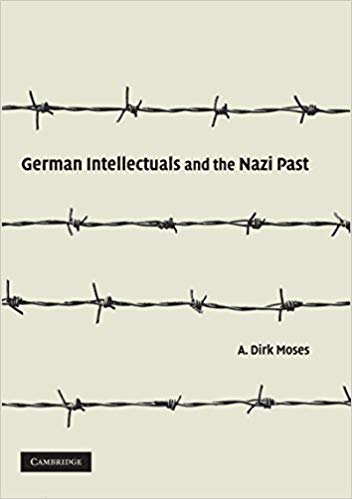Censored Scholar Martin Hohmann Moses

German Intellectuals and the Nazi Past, by A. Dirk Moses. 2007
Censorship of Martin Hohmann For Questioning the Party Line on Jewish Innocence. Also, the Taboo on Realizing the Equivalence of Nazi and Communist Crimes. Polokaust Ignored in German “Repentance”
The Nazi German extermination of 6 million Jews is fact. Its self-evident special status is not. That is what I emphasize in my review.
CENSORSHIP: MARTIN HOHMANN FIRED FOR TELLING THE TRUTH ABOUT THE JEWISH LEADERSHIP IN SOVIET COMMUNISM (ZYDOKOMUNA)
A. Dirk Moses editorializes about this free-speech-chilling incident, as he writes, “Four years later, Hohmann was expelled from his party for an anti-Semitic speech accusing Jews of being (also) a perpetrator people. Most voters and supporters of the Christian Democrats, however, did not regard the speech as anti-Semitic.” (pp. 23-24). Evidently, the latter had more common sense than either the author or those who fired Martin Hoffmann merely for speaking his mind and for bringing politically-incorrect facts to light.
AND DON’T YOU DARE COMPARE NAZISM TO COMMUNISM
The author dismisses the works of historian Ernst Nolte with the following rather flippant remarks, “During the 1970s and 1980s, he [Nolte] advocated the historicization of the Holocaust through a strategy of spurious comparisons with other genocidal experiences.” (p. 253). However, Holocaust preeminence aside, author Moses does not explain why such a comparison is imagined to be spurious.
On a related VERBOTEN topic, the Social Democratic historian Heinrich August Winkler said that the time had come to end the taboo on associating communism and fascism. (p. 242). Yeah, no kidding!
ONLY THE JEWS ARE SERIOUSLY CONSIDERED AS VICTIMS OF NAZI GERMANY
This work focuses on how Germans accept collective responsibility for the Holocaust (e. g, pp. 268-269), but there is no consideration of how Germans should accept collective responsibility for German crimes against other peoples (e. g, for the Polokaust). In addition, this works ignores the strong opposite tendency—of the de-Germanization of the Nazis and other forms of German guilt diffusion.
Thus, the title of this book is a bit misleading. It is less about a “Nazi past” as it is a one-sided German intellectuals’ rumination over past German crimes against Jews—as if the Holocaust was the ONLY crime that Germans ever committed. In fact, this work is scrupulously sanitized of any mention of the genocidal German crimes against Poles. Check the index: “Poles” and “Poland” do not appear even once! Note also that this is a regressive step: For some time after WWII, German leaders used to apologize to Poles for Nazi German crimes.
There is a healthy dose of the mystification of the Holocaust. For instance, we hear of it as “the absolute moral abomination, a denial of all things civilized without precedent or parallel” (p. 24), the “sacralization process” of Jewish deaths (p. 243), and “the foundational event of suffering” (p. 271). Needless to say, we never hear such grandiose words spoken about the genocides of any other peoples. Much of this work also features the standard Holocaustspeak. For instance, we hear for the umpteenth time about “Coming to terms with the past” (p. 269), which Jews are never asked to do for their crimes—to the contrary (see below).
THE POLITICS OF VICTIMHOOD: HOLOCAUST SUPREMACISM GOVERNS GERMAN THINKING
Author A. Dirk Moses comments, “…agreeing with Western intellectuals that the Holocaust was a singular or unique event, above all in relation to Stalinist crimes. In other words, with the backing of American, English, and Israeli historians, these non-German German intellectuals were able to render the Holocaust an internationally-recognized stigma. They became managers of this stigma excoriating anyone who doubted the Holocaust’s uniqueness.” (p. 220).
The author continues, “Left-liberals asserted that Germany’s ‘Western,’ liberal political culture was inextricably tied to its consciousness of responsibility for Auschwitz. To diminish this memory or to relativize the singularity of the Holocaust threatened this painfully won political ‘normality’ of the 1980s. Conservatives retorted that the memory had become a dogma and a taboo that amounted to destructive collective obsession with guilt and that prevented the development of a ‘normal’ national identity like that of the ‘Western’ powers.” (pp. 221-222).
To see a series of truncated reviews in a Category click on that Category:
- All reviews
- Anti-Christian Tendencies
- Anti-Polish Trends
- Censorship on Poles and Jews
- Communization of Poland
- Cultural Marxism
- German Guilt Dilution
- Holocaust Industry
- Interwar Polish-Jewish Relations
- Jewish Collaboration
- Jewish Economic Dominance
- Jews Antagonize Poland
- Jews Not Faultless
- Jews' Holocaust Dominates
- Jews' Holocaust Non-Special
- Nazi Crimes and Communist Crimes Were Equal
- Opinion-Forming Anti-Polonism
- Pogrom Mongering
- Poland in World War II
- Polish Jew-Rescue Ingratitude
- Polish Nationalism
- Polish Non-Complicity
- Polish-Ukrainian Relations
- Polokaust
- Premodern Poland
- Recent Polish-Jewish Relations
- The Decadent West
- The Jew as Other
- Understanding Nazi Germany
- Why Jews a "Problem"
- Zydokomuna